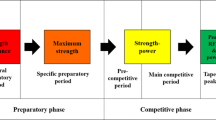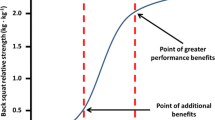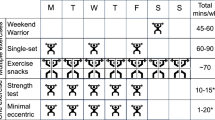Abstract
This study investigated the effect of a 10-week power training (PT) program versus traditional resistance training (TRT) on functional performance, and muscular power and strength in older men. Twenty inactive volunteers (60–76 years old) were randomly assigned to a PT group (three 8–10 repetition sets performed as fast a possible at 60% of 1-RM) or a TRT group (three 8–10 repetition sets with 2–3 s contractions at 60% of 1-RM). Both groups exercised 2 days/week with the same work output. Outcomes were measured with the Rikli and Jones functional fitness test and a bench and leg press test of maximal power and strength (1-RM). Significant differences between and within groups were analyzed using a two-way analysis of variance (ANOVA). At 10 weeks there was a significantly (P < 0.05) greater improvement in measures of functional performance in the PT group. Arm curling improved by 50 versus 3% and a 30 s chair-stand improved by 43 versus 6% in the PT and TRT groups, respectively. There was also a significantly greater improvement in muscular power (P < 0.05) in the PT group. The bench press improved by 37 versus 13%, and the leg press by 31 and 8% in the PT and TRT groups, respectively. There was no significant difference between groups in improved muscular strength. It appears that in older men there may be a significantly greater improvement in functional performance and muscular power with PT versus low velocity resistance training.
Similar content being viewed by others
References
Adams KJ, Swank AM, Berning JM, Sevene-Adams PG, Barnard KL, Shimp-Bowerman J (2001) Progressive strength training in sedentary, older African American women. Med Sci Sports Exerc 33:1567–1576
Bassey EJ, Fiatarone MA, O’neill EF, Evans WJ, Lipsitz LA (1992) Leg extensor power and functional performance in very old men and women. Clin Sci 82:321–327
Behm DG, Sale DG (1993) Intended rather than actual movement velocity determine velocity-specific training response. J Appl Physiol 74:359–368
Bosco C, Komi PV (1980) Influence of age on the mechanical behavior of leg extensor muscle. Eur J Appl Physiol 45:209–219
Bottaro M, Russo A, Oliveira RJ (2005) The effects of rest interval on quadriceps torque during an isokinetic testing protocol in elderly. J Sports Sci Med 4:285–290
Bradley AL, Ball TE (1992) The Wingate test: effects of load on the power outputs of female athletes and non-athletes. J Appl Sports Sci Res 6:193–199
Brandon J, Boyette L, Gaasch D, Lloyd A (2000) Effects of lower extremity strength training on functional mobility in older adults. J Aging Phys Act 8:214–227
Brown LE, Weir JP (2001) American society exercise physiologists procedures recommendations I: accurate assessment of muscular strength and power. J Exerc Physiol 4:1–21
Coyle EF, Feiring DC, Rotkis TC, Cote RW, Roby FB, Lee W, Wilmore JH (1981) Specificity of power improvements through slow and fast isokinetic training. J Appl Physiol 51:1437–1442
De Vito G, Bernardi M, Forte R, Pulejo C, Macaluso A, Figura F (1998) Determinants of maximal instantaneous muscle power in women aged 50–75 years. Eur J Appl Physiol 78:59–64
Earles DR, Judge JO, Gunnarsson OT (2001) Velocity training induces power-specific adaptations in highly functioning older adults. Arch Physiol Med Rehabil 82:872–878
Evans W (1999) Exercise guidelines for the elderly. Med Sci Sports Exerc 31:12–17
Fielding RA, Lebrasseur NK, Cuoco A, Bean J, Mizer K, Fiatarone MA (2002) High-velocity resistance training increases skeletal muscle peak power in older women. J Am Geriatr Soc 50:655–662
Fleck SJ, Kraemer WJ (2004) Design resistance training programs, 3rd edn. Human Kinetics, Champaign
Frontera WR, Hughes VA, Lutz KJ, Evans WJ (1991) A cross-sectional study of muscle strength and mass in 45- to 78-year-old men and women. J Appl Physiol 71:644–650
Foldvari M, Clark M, Laviolette LC, Bernstein MA, Kaliton D, Castaneda C et al (2000) Association of muscle power with functional status in community-dwelling elderly women. J Gerontol A Biol Sci Med Sci 55A:M192–M199
Häkkinen K, Pakarinen A (1993) Muscle strength and serum testosterone, cortisol and SHBG concentrations in middle-aged and elderly men and women. Acta Physiol Scand 148:199–207
Häkkinen K, Pakarinen A, Newton RU, Kraemer WJ (1998) Acute hormone responses to heavy resistance lower and upper extremity exercise in young versus old men. Eur J Appl Physiol 77:312–319
Häkkinen K, Kraemer WJ, Newton RU, Alen M (2001) Changes in electromyographic activity, muscle fiber and force production characteristics during heavy resistance/power strength training in middle-aged and older men and women. Acta Physiol Scand 171:51–62
Häkkinen K, Kraemer WJ, Pakarinen A, Triplett-mcbride T, Mcbride JM, Häkkinen A, et al (2002) Effects of heavy resistance/power training on maximal strength, muscle morphology, and hormonal response patterns in 60–75 years old men and women. Can J Appl Physiol 27:213–231
Henwood TR, Taaffe DR (2005) Improved physical performance in older adults undertaking a short-term program of high-velocity resistance training. Gerontology 51:108–115
Hruda KV, Hicks AL, Mccartney N (2003) Training for muscle power in older adults: effects on functional abilities. Can J Appl Physiol 28:178–189
Hunter GR, Wetzstein CJ, Mclafferty CL, Zuckerman PA, Landers KA, Bamman MM (2001) High-resistance versus variable-resistance training in older adults. Med Sci Sports Exerc 33:1759–1764
Izquierdo M, Aguardo X, Gonzales R, López JL, Hakkinen K (1999) Maximal and explosive force production capacity and balance performance in men of different ages. Eur J Appl Physiol 79:260–267
Izquierdo M, Häkkinen K, Ibañez J, Garrues M, Antón A, Zúniga A et al (2001) Effects of strength training on muscle power and serum hormones in middle-aged and older men. J Appl Physiol 90:1497–1507
Izquierdo M, Ibañez J, González-Badillo JJ, Häkkinen K, Ratamess NA, Kraemer WJ, et al (2006) Differential effects of strength training leading to failure versus not to failure on hormonal responses, strength, and muscle power gains. J Appl Physiol 100:1647–1656
Jozsi AC, Campbell WW, Joseph L, Davey SL, Evans WJ (1999) Changes in power with resistance training in older and younger men and women. J Gerontol A Biol Sci Med Sci 54A:M591–M596
Kamel KH (2003) Sarcopenia and aging. Nutr Rev 61:157–167
Komi P (1988) Physiological and biomechanical correlates of muscle function: effects of muscle structure and stretch shortening cycle on force and speed. In: Terjung RL (ed) Exercise sport science review. Callamore-Health, Lexington
Kraemer WJ, Fry AC (1995) Strength testing: development and evaluation of methodology. In: Maud PJ, Foster C (eds) Physiological assessment of human fitness. Human Kinetics, Champaign, pp 115–138
Kraemer WJ, Adams K, Cafarelli E, Dudley GA, Dooly C, Feigenbaum MS, et al (2002) American college of sports medicine: progression models in resistance training for healthy adults. Med Sci Sports Exerc 34:364–380
Latham NK, Bennet DA, Stretton CM, Anderson CS (2004) Systematic review of progressive resistance strength training in older adults. J Gerontol A Biol Sci Med Sci 59A:48–61
Lexell J (1995) Human aging, muscle mass, and fiber type composition. J Gerontol A Biol Sci Med Sci 50S:11–16
Linnamo V, Newton RU, Häkkinen K, Komi PV, Davie A, Mcguigan M et al (2000) Neuromuscular responses to explosive and heavy resistance loading. J Electromyogr Kinesiol 10:417–424
Lohman TG, Roche AF, Martorell R (1991) Anthropometric standardization reference manual, 2nd edn. Human Kinetics, Champaign
Lyttle AD, Wilson GJ, Ostrowski KJ (1996) Enhancing performance: maximal power versus combined weights and plyometrics training. J Strength Cond Res 10:173–179
Mazzeo RS, Cavanagh P, Evans WJ, Fiatarone M, Hagberg J, McAuley E, Startzell J (1998) American college of sports medicine: position stand on exercise and physical activity for older adults. Med Sci Sports Exerc 30:992–1008
Metter EJ, Conwit R, Tobin J, Fozard JL (1997) Age-associated loss of power and strength in the upper extremities in women and men. J Gerontol A Biol Sci Med Sci 52A:B267–B276
Miller JP, Pratley RE, Goldberg AP, Gordon P, Rubin M, Treuth MS, et al (1994) Strength training increases insulin action in healthy 50 to 65-year-old men. J Appl Physiol 77:1122–1127
Miszko TA, Cress ME, Slade JM, Covey CJ, Agrawal SK, Doerr CE (2003) Effect of strength and power training on physical function in community-dwelling older adults. J Gerontol A Biol Sci Med Sci 58A:M171–M175
Moritani T (1993) Neuromuscular adaptations during the acquisition of muscle strength, power and motor tasks. J Biomech 26:95–107
Newton RU, Häkkinen K, Häkkinen A, Mccormick M, Volek J, Kraemer WJ (2002) Mixed-methods resistance training increases power and strength of young and older men. Med Sci Sports Exerc 34:1367–1375
Proctor DN, Balagopal P, Nair KS (1998) Age-related sarcopenia in humans is associated with reduced synthetic rates of specific muscle proteins. J Nutr 128:351S–355S
Rikli RE, Jones CJ (1999) Development and validation of a functional fitness test for community-residing older adults. J Aging Phys Act 7:129–161
Sale DG (1992) Neural adaptation to strength training. In: Komi PV (ed) Strength and power in sport. Blackwell, Malden, pp 249–265
Shaw CE, Mccully KK, Posner JD (1995) Injuries during the one repetition maximum assessment in the elderly. J Cardiopulm Rehabil 15:283–287
Skelton DA, Greig CA, Davies JM, Young A (1994) Strength, power and related functional ability of healthy people aged 65–89 years. Age Ageing 23:371–377
Skelton DA, Young A, Greig CA, Malbut KE (1995) Effects of resistance training on strength, power, and selected functional abilities of women aged 75 and older. J Am Geriatr Soc 43:1081–1087
Author information
Authors and Affiliations
Corresponding author
Rights and permissions
About this article
Cite this article
Bottaro, M., Machado, S.N., Nogueira, W. et al. Effect of high versus low-velocity resistance training on muscular fitness and functional performance in older men. Eur J Appl Physiol 99, 257–264 (2007). https://doi.org/10.1007/s00421-006-0343-1
Accepted:
Published:
Issue Date:
DOI: https://doi.org/10.1007/s00421-006-0343-1




